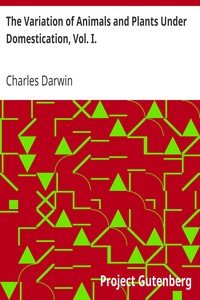The Variation of Animals and Plants Under Domestication, Vol. I. by Charles Darwin
"The Variation of Animals and Plants Under Domestication, Vol. I" by Charles Darwin is a scientific publication written in the late 19th century. This work focuses on the effects of domestication on the variation of animals and plants, detailing how various environmental factors influence the characteristics of these organisms. Through a methodical examination, Darwin aims to uncover the principles of variation and how they relate to both domestic species and broader natural
processes. The opening of this volume introduces the book’s primary objective: to explore how domesticated animals and cultivated plants have changed under human influence. Darwin emphasizes the monumental task of documenting the vast array of domesticated varieties, yet clarifies that he will focus on specific examples, such as pigeons, foxes, and rabbits. He discusses key concepts affecting variation, including natural selection, the hereditary nature of traits, and the principle of selection exercised by humans. This foundation sets the stage for a detailed assessment of how domestication leads to variability in both appearance and function, establishing crucial connections to his broader theories on evolution and natural selection. (This is an automatically generated summary.)
Read or download for free
| How to read | Url | Size | |||
|---|---|---|---|---|---|
| Read now! | https://www.gutenberg.org/ebooks/24923.html.images | 1.4 MB | |||
| EPUB3 (E-readers incl. Send-to-Kindle) | https://www.gutenberg.org/ebooks/24923.epub3.images | 2.9 MB | |||
| EPUB (older E-readers) | https://www.gutenberg.org/ebooks/24923.epub.images | 2.9 MB | |||
| EPUB (no images, older E-readers) | https://www.gutenberg.org/ebooks/24923.epub.noimages | 543 kB | |||
| Kindle | https://www.gutenberg.org/ebooks/24923.kf8.images | 18.5 MB | |||
| older Kindles | https://www.gutenberg.org/ebooks/24923.kindle.images | 18.4 MB | |||
| Plain Text UTF-8 | https://www.gutenberg.org/ebooks/24923.txt.utf-8 | 1.1 MB | |||
| Download HTML (zip) | https://www.gutenberg.org/cache/epub/24923/pg24923-h.zip | 2.9 MB | |||
| There may be more files related to this item. | |||||
Similar Books
About this eBook
| Author | Darwin, Charles, 1809-1882 |
|---|---|
| Title | The Variation of Animals and Plants Under Domestication, Vol. I. |
| Note | Reading ease score: 57.6 (10th to 12th grade). Somewhat difficult to read. |
| Note | Wikipedia page about this book: https://en.wikipedia.org/wiki/The_Variation_of_Animals_and_Plants_Under_Domestication |
| Credits |
Produced by Steven Gibbs, Keith Edkins and the Online Distributed Proofreading Team at http://www.pgdp.net |
| Language | English |
| LoC Class | QH: Science: Natural history |
| Subject | Variation (Biology) |
| Subject | Domestic animals |
| Subject | Plants, Cultivated |
| Category | Text |
| EBook-No. | 24923 |
| Release Date | Mar 27, 2008 |
| Copyright Status | Public domain in the USA. |
| Downloads | 386 downloads in the last 30 days. |
| Project Gutenberg eBooks are always free! | |

